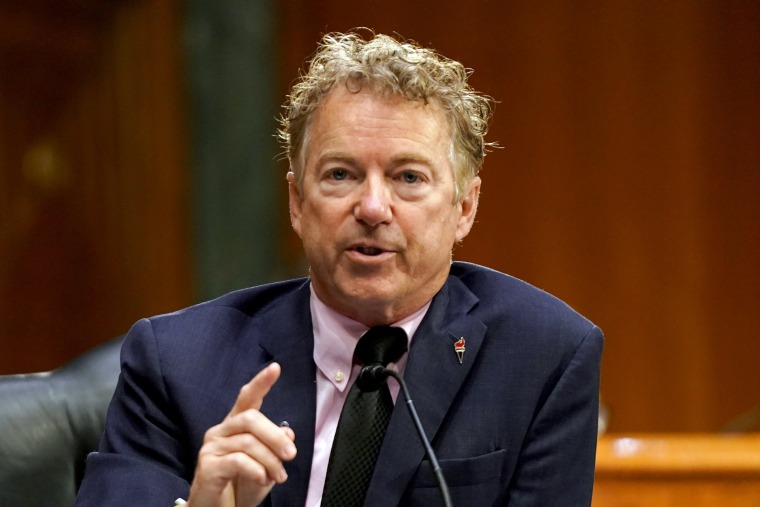WASHINGTON — Republicans are sending a pointed warning to congressional Democrats: If you raise taxes on corporations and top earners, we'll just cut them back when we regain power.
President Joe Biden is considering whether to strike a deal with Republicans on a modest infrastructure package that wouldn't raise taxes — a GOP red line — or to go it alone and pass a larger bill through a special process that can be done with only Democratic votes. Or to do both.
Either way, the two sides are headed for a showdown over taxes, which Biden sees as key to funding priorities like clean energy investments and money to care for children and the elderly. And Republicans are quick to say Democrats' gains may be short-lived.
"There's no doubt in my mind that anybody running next year should be talking about reversing what I think are going to be tax increases at the worst possible time," said Sen. Thom Tillis, R-N.C., arguing that raising taxes on corporations and capital gains would harm the economy.
Tillis added that if the taxes are cut, future lawmakers would be less likely to continue expansions of the economic safety net because of a lack of revenue.
"The numbers don't work," he said, adding that if Democrats find bipartisan support, "the funding mechanisms would have some staying power. But if they go on alone, they won't."
Sen. Rand Paul, R-Ky., said that no Republicans would vote for the new taxes and that when his party regains power, "we would get rid of them."
"But we'd have to have all three branches of government," he said. "We don't like the taxes."
The White House is trying to build on the public popularity of Biden's plans to raise the corporate tax rate to 28 percent and the top tax rate to 39.6 percent. A Quinnipiac University poll conducted last month found that support for Biden's $2 trillion infrastructure and jobs plan grows by 9 points if it is attached to a corporate tax increase. By 2-to-1 ratios, respondents said they support higher taxes on corporations and on people earning more than $400,000 a year.
Some Democrats want to lean in to the tax fight, seeing it as an opportunity to exploit the dissonance between the GOP's working-class message and its policy alignment with wealthy Americans — an extension of their campaign against the 2017 tax law Republicans passed on party-line votes.
"If Republicans want to run for election by doubling down on more tax cuts for the wealthy and corporations, more power to them," Dan Pfeiffer, a former top adviser to President Barack Obama, said in an email. "The 2017 tax bill is the single worst polling piece of legislation that I have seen in my career. Good luck running on it again."
For Democrats, the longevity of the tax increases — and potentially the economic programs they're designed to finance — could hinge on making the higher taxes so popular that Republicans would fear a backlash if they cut them in the future.
"At a time of again massive income and wealth inequality, it is appropriate that the rich start paying their fair share," said Sen. Bernie Sanders, I-Vt. "That can raise the revenue that we need to fund programs that working families desperately need."
'We're the party of lower taxes'
Sen. John Cornyn, R-Texas, said he "would not be surprised" if Republicans move to undo Biden's tax hikes the next time they control Washington.
"They're the party of big government. We're the party of lower taxes and more freedom," he said. "That's kind of the problem with doing business this way on a purely partisan basis."
Sen. Jerry Moran, R-Kan., who is up for re-election next year, said avoiding sharp swings in policy is "a reason not to" govern on a party-line basis.
"We ought to avoid the ups and downs, the uncertainty that comes with a change after every election," he said.
Senate Finance Committee Chair Ron Wyden, D-Ore., said it's "absolutely crucial" for Democrats to emphasize the need for economic investments to voters and to make the case for tax "fairness" on top earners to set up a safety net that can stand the test of time.
"I say this to everyone: If you're a nurse in Medford, Oregon, treating Covid patients, you pay taxes with every single paycheck — no tax havens for you. If you're somebody who's a well-connected billionaire, it's very different. It's to a great extent optional," he said. "People have never heard that. They say that's not right. Everybody should have to pay their fair share."
Rep. Brendan Boyle, D-Pa., said Democrats should ignore GOP warnings about taxes, arguing that they would seek to cut social programs and lower taxes on the wealthy no matter what Biden does.
"Owning the libs and cutting taxes, mostly for the rich, are the two things that every stripe of Republican seems to agree on," he said.

